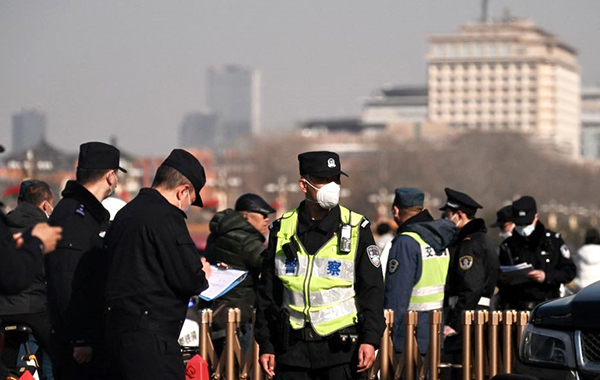Before the CCP's Two Sessions convened, Beijing police conducted inspections at Tiananmen Square.
[People News] The Chinese Communist Party’s (CCP) Beidaihe meeting is customarily held in late July or early August each year. But even before July this year, the situation in Beidaihe appeared tense, as if facing a major crisis. Some political observers believe the CCP leadership may have moved the Beidaihe retreat forward. The reason, they say, is the urgent need to balance various factions amid personnel changes, hasten the Fourth Plenary Session of the 20th Central Committee, and begin preparing the post-Xi power structure for the 21st National Congress.
According to multiple sources, security measures along the route from Beijing to Beidaihe have been significantly tightened. There is a noticeable increase in checkpoints along the way, and passengers at train stations and on trains are subjected to multiple layers of inspection. Travellers using ticketing apps discovered that no trains were available between June 26 and July 7 near Beidaihe Station. After July 8, tickets to Beidaihe have become very difficult to obtain. Netizens suspect that this unusual situation suggests that CCP high-level officials have already begun arriving in Beidaihe.
A petitioner named Ms. Zhao said that, according to her companions, many intersections along the route from Beijing to Beidaihe now have police vehicles and plainclothes officers. There are seven inspection checkpoints along the way, starting from entering the Beijing station, getting on the train, security checks onboard, and continuing through disembarking, exiting the station, and even taking a taxi. The atmosphere is described as extremely tense. It is widely observed that whenever the CCP holds a major party or national meeting—or international summit—it treats it like a state funeral, mobilising the nation against its own people. But this year, the density of security outposts around Beidaihe is even greater than usual, suggesting the CCP may be handling something bigger and more secretive.
Still not satisfied with using all available regional security forces, both Beijing and Hebei have issued verbal directives requiring local authorities to tightly monitor and control “sensitive individuals,” particularly petitioners and dissidents, who are strictly forbidden from approaching the Beidaihe area. Insiders revealed that coastal hotels and guesthouses have been commandeered by the government, and regular citizens are barred from checking in. Additionally, cell phone and internet signals in the area are reported to be weak and unstable, suggesting deliberate interference.
The Beidaihe meeting is a closed-door power-sharing summit among CCP elites, where personnel arrangements are often finalised. Later, these decisions are rubber-stamped in a formal session and then publicly announced. Analysts believe this year’s Beidaihe gathering may result in consensus on key leadership changes. It’s possible that princelings, second-generation red elites, and party elders will propose a new leadership lineup, transferring much of Xi Jinping’s power to a successor. A new Politburo Standing Committee could even be formed, setting the tone for the upcoming Fourth Plenary Session of the 20th Central Committee.
Political commentator Li Muyang stated that the Fourth Plenary Session is expected to focus mainly on party governance and personnel changes. Some sources claim that Xi Jinping will step down as the CCP General Secretary at this session. If the CCP leadership has indeed convened early in Beidaihe, it may signal that the Fourth Plenary Session will be held soon.
Gregory W. Slayton, a former U.S. diplomat, recently published an analysis predicting that Xi Jinping is likely to step down during the Fourth Plenary Session in August, or be reduced to a ceremonial role.
He bases this prediction on a number of unusual signs surrounding Xi:
-
Purge of Military Loyalists: Dozens of Xi’s trusted military allies have recently been purged or died under suspicious circumstances, including Navy Chief of Staff Li Hanjun, whose status as a National People’s Congress delegate was officially revoked on June 27. These figures have been replaced by generals from rival factions.
-
Renaming of Memorial Site: A memorial hall in Shaanxi originally dedicated to Xi’s father, Xi Zhongxun, was abruptly renamed the “Guanzhong Revolutionary Memorial Hall,” erasing Xi Zhongxun’s name.
-
Reduced Security Detail: Xi’s personal security team has been cut in half recently.
-
Disappearance from Public Eye: Xi mysteriously disappeared for about two weeks between late May and early June. During that time, his appearances in the CCP’s flagship newspaper, People’s Daily, also dropped significantly. When he reappeared in early June, he received Belarusian President Lukashenko not in a traditional state hall but in a rarely used, private, family-style venue within Zhongnanhai. The scale and pomp of the meeting were noticeably subdued. In contrast, other CCP leaders have continued to host lavish official events in grand venues.
-
State Media Omits Titles: After Xi’s recent phone call with former U.S. President Donald Trump, state media, including CCTV, referred to Xi without any formal titles—a highly unusual move.
Slayton concludes that these signs point to a significant transformation within the CCP power structure. He cited the famous saying: “Power corrupts, and absolute power corrupts absolutely.” He expressed hope that China will move toward a path of free markets, individual liberty, true democracy, and the rule of law. However, he noted that as long as the CCP remains intact, China’s chances for such transformation are slim.
(First published by People News)











News magazine bootstrap themes!
I like this themes, fast loading and look profesional
Thank you Carlos!
You're welcome!
Please support me with give positive rating!
Yes Sure!